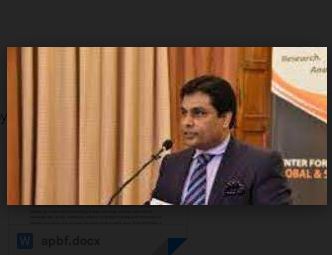DNA
ISLAMABAD: The All Pakistan Business Forum has said the country’s economy is plunging into deepening ravine with plummeting foreign exchange reserves and volatile exchange rate, as the continuous reliance on foreign funding and borrowing will deepen economic crisis because the government needs more than $23 billion in foreign debt repayments for this fiscal year.
APBF President Syed Maaz Mahmood said that it is high time that the government should start thinking about the debt restructuring, as the multilateral donors and friendly countries’ huge sum of aid pledges might not bring any significant impact on struggling economy, because the sustainable solution to Pakistan’s economic issues lies in the structural reforms and consistent policies.
The government’s dilemma is that should it protect it’s remaining vote bank by not going the IMF or protect the economy by going to the IMF. However, it immediate preference seems protecting the vote bank but it may end up losing the both due to hyperinflation likely to be followed by a default.
APBF Chairman Ibrahim Qureshi said that undertaking structural reforms require political will. He said that enacting structural reforms, such as improvements in tax collection system, bureaucracy and ease of doing business requires major political will and strict implementation of policies, he added.
Ibrahim Qureshi said that this is the first time the world has acknowledged climate loss and set a new precedent by pledging billions of dollars for the victims of rains and floods in Pakistan, he said, recalling that earlier the global community had pledged for Ukraine, Syria and other countries but the difference is that this time it is for climate loss.
Though the world community responded overwhelmingly to Pakistan’s appeal for the recovery of flood-hit areas at the International Conference on Climate Resilient in Geneva, chances are slim that donors will make good on their commitments mainly because of the domestic political situation.
Maaz Mahmood observed that the delay in the resumption of the IMF loan program and political instability exacerbated the country’s vulnerability through the depletion of foreign exchange reserves. He said that trade and industry need low cost energy to bring down their cost of production, keeping their goods competitive in the international market.
He said that the government would have to reduce the price of electricity along with the cut in the prices of petroleum products to bring down the cost of doing business and to promote industrial activities. He said that the business activities were already in decline and in this situation the government should take serious steps to cut the cost of doing business, as continued hike in oil rates would further enhance the cost of production, making transport more expensive.
He said that the experience from FY22 brought to the fore once again the need to address the country’s structural weaknesses, such as a narrow base of foreign exchange earnings and meager inflows of foreign investment.
He said that the experience from FY22 brought to the fore once again the need to address the country’s structural weaknesses, such as a narrow base of foreign exchange earnings and meager inflows of foreign investment.
He stressed that priority should be given to producing new varieties of seeds that are suitable to varying weather conditions and to devise a framework that emphasizes water management strategies to increase agricultural productivity.











